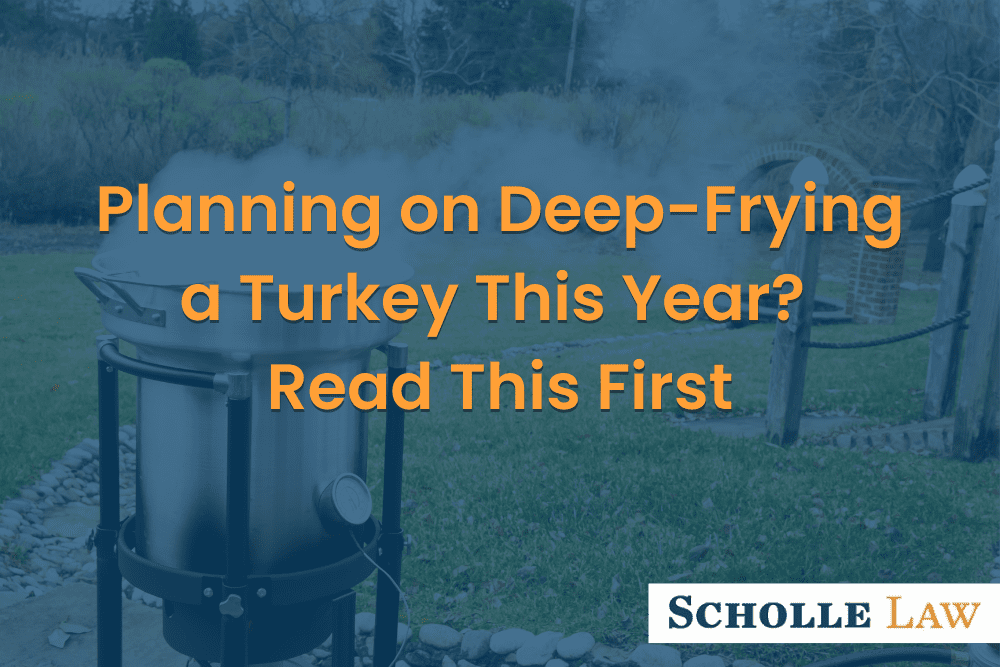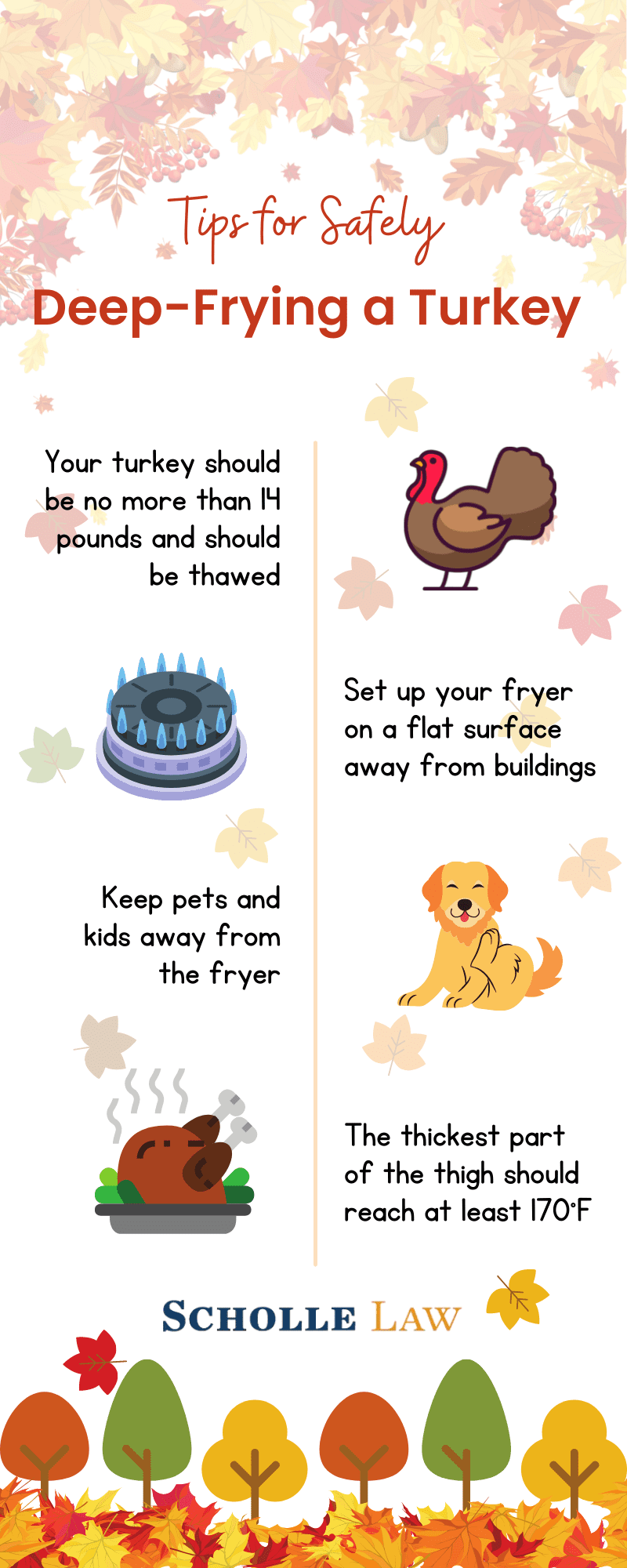
In recent years, deep-fried turkey has become a staple for Thanksgiving, Christmas and, for some, any time the mood strikes. Similar to frying chicken or other foods, deep-frying a turkey creates crispy skin, juicy meat and flavor that simply cannot be matched.
But, similar to frying chicken and other foods, frying a turkey comes with dangerous risks. In fact, frying your bird is often more dangerous that deep-frying other foods. This is because turkey fryers are typically massive stock pots filled with boiling oil over an open propane flame. In addition, unlike other preparations, frying must be done outside. That makes it easy to neglect the fryer, especially in cold weather, which can lead to hot oil spills, fires and even explosions.
Many people who do fry turkeys for the holidays are well aware of these risks and accept them in return for a delicious bird. If you are planning on deep-frying a turkey on Thanksgiving, make sure you keep these safety tips in mind. And if you are injured by someone else’s actions or negligence this holiday season, remember that we are here to help. Our Gwinnett personal injury lawyers are here to discuss your case and help you find the optimal outcome. Contact us online or call us today at (866) 592-1296 for a free, no-obligation consultation. We are available 24/7 – including holidays.
The Dangers of Deep-Frying a Turkey
While deep-frying has become a popular preparation for turkey, there are some major risks to be aware of. Every year, an average of five deaths, 60 injuries and over $15 million in property damage are attributed to deep fryer accidents. There are quite a few causes for these terrible incidents, including:
- The pot falling over or off the burner
- Oil spilling into the burner when inserting or removing the turkey
- Burns from touching the pot or lid
- Using a frozen or partially frozen turkey, causing spillover or an explosion
Most, if not all, of these injuries can be prevented by using the proper equipment and making sure you are fully set up before frying your turkey. Always wear pants, a long sleeve shirt or jacket, safety goggles and heat-resistant gloves to avoid burns. Then, follow the instructions below to fry a turkey your family, friends and guests will love.
Step 1: Pick the Right Turkey
Unlike baking turkey, there is a firm size limit on the size of the bird you want to deep-fry. Your frying setup will likely use a 30-quart stock pot; you should avoid using anything bigger unless you really know what you are doing. With a 30-quart pot, you should use a turkey that weighs no more than 14 pounds. If you use a bigger bird, it may not cook properly – and the oil may spill over from the pot, which can be disastrous.
Once you have picked your turkey, it must be thawed before it can be fried. If you try to deep-fry a frozen turkey, there is a strong chance the pot with explode. After all, water and hot oil do not mix.
Pat down the turkey to remove excess moisture. Then, either use a dry rub or a turkey injector to season the meat. For the best flavor, leave your seasoned bird in the fridge for at least a day before frying.
Step 2: Set Up Your Fryer
If you deep-fry food in your kitchen, you may be wondering why this step is so important. When you deep-fry on your stovetop, you are doing so on a flat surface with minimal wind and other potentially dangerous factors. But when you are frying a turkey outdoors, the risk of things going wrong increases exponentially.
Before you ever consider putting your turkey in the fryer, you must make sure the area is optimized for it. Your fryer should be placed on a flat surface, far away from any buildings or other flammable materials. The best option would be to lay down paver stones on the flattest spot in your yard to make sure the stockpot stays level.
Conversely, you can put your fryer on your driveway or street in front of your house if it is level. However, you will need to make sure you are far away from buildings and you are not breaking any neighborhood rules. No matter where you set up your fryer, make sure you have a fire extinguisher nearby.
Step 3: Fry Your Turkey
When your fryer is set up and your turkey is ready to go, it is time to make the centerpiece of your delectable dinner. First, place your turkey in the pot and fill it with water until about an inch of liquid covers the turkey. Then, remove the turkey, pat the bird dry and set it aside. Mark or note where the water line is with the turkey removed; this is the fill line for the oil. If this line is above the recommended fill line the manufacturer etched in the pot, you will need to break down the turkey before frying. Dump out the water and dry the pot before the next step.
Set the pot on the burner WITHOUT TURNING IT ON, then fill the pot to the pre-marked fill line with oil. Otherwise, the oil may drip onto the flame, which can cause a fire. You will want to use a neutral cooking oil with a high smoke point, such as peanut, canola or vegetable oil. Otherwise, the oil will burn, releasing potentially toxic chemicals and ruining your turkey.
With the pot full of oil and the lid on, carefully hook up your propane tank to the burner and turn it on. Your oil will need to reach about 275°F before it is ready to start cooking the turkey. Once the oil has been preheated, turn off the burner and slowly lower the turkey breast-side down into the pot, then turn the burner back on.
Keep the oil temperature around 300°F; if it reaches above 400°F, turn down the flame to avoid burning the oil. The bird will need to cook for about four minutes per pound.
Never leave the fryer unattended while it is in use. In addition, make sure pets and children are kept well away from the fryer, as they can easily knock over the pot of hot oil or otherwise seriously injure themselves.
Step 4: Remove and Test the Turkey
Once you believe the turkey is cooked, turn off the flame and carefully remove the bird. If you do not turn off the flame before removing the turkey, there is a strong chance of oil dripping down into the burner. Use your meat thermometer to test the meat. The thickest part of the thigh should reach at least 170°F before it is considered cooked.
Make sure you are using a clean platter or container to carry the cooked turkey. If you use the same one you used for the raw bird, you are increasing your risk of salmonella or other food-borne illnesses. Make sure to let the turkey rest for at least 20 minutes before slicing into it. Otherwise, you may lose all the juiciness that frying the turkey provided.
Step 5: Break Down Your Fryer
Now that the turkey is fried and the burner is off, carefully detach the propane tank and move it away from the fryer. It will take quite a few hours for the oil to cool down in the pot; you do not need to stay with the fryer while it is cooling. However, you will still want to ensure that no children or pets are around the pot as it is cooling. Even warm oil can still cause injuries, and spilling cool oil can create a cleanup headache that can put a damper on your celebrations.
When the oil is cooled, pour it back into a plastic container for either reuse or disposal. Then, simply clean the pot like you would any other dish. Make sure you store the burner and propane in a cool, outdoor location away from flames.
Injured During the Holidays? We Can Help
No deep-frying is foolproof, especially when it comes to outdoor flames and gallons of oil. But if you follow these steps and take every precaution during the process, you can cook a turkey that is sure to wow everyone around the dinner table.
Of course, deep-frying turkey is not the only way you may get injured during the holidays. You may be injured in a car accident, in a slip and fall accident, or any number of other incidents. No matter the case, if you are injured due to someone else’s negligence or actions this holiday season, the Duluth personal injury lawyers at Scholle Law are here to help.
Whether it is Thanksgiving night or Christmas morning, we are always here to talk with you. Contact us online or call us today at (866) 592-1296 for a free, no-obligation consultation. We are available 24/7 – including holidays.

